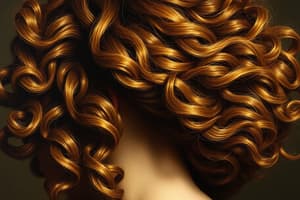Podcast
Questions and Answers
What is the study of hair known as?
What is the study of hair known as?
Trichology
The body can produce _______ of the 20 amino acids that make up hair and your diet must include the remaining essential amino acids.
The body can produce _______ of the 20 amino acids that make up hair and your diet must include the remaining essential amino acids.
11
A mature strand of human hair is divided into two principal parts known as the?
A mature strand of human hair is divided into two principal parts known as the?
Hair root and hair shaft
What is a tube-like depression in the skin that encases the hair root called?
What is a tube-like depression in the skin that encases the hair root called?
What is the thickened, club-shaped elevation located at the bottom of the hair follicle called?
What is the thickened, club-shaped elevation located at the bottom of the hair follicle called?
A small involuntary muscle attached to the hair follicle is known as?
A small involuntary muscle attached to the hair follicle is known as?
What are the oil glands of the skin connected to hair follicles called?
What are the oil glands of the skin connected to hair follicles called?
Hair is composed of cells arranged in three layers known as?
Hair is composed of cells arranged in three layers known as?
The cortex contains coloring matter in the form of minute grains of _______ or pigment.
The cortex contains coloring matter in the form of minute grains of _______ or pigment.
Long, coarse, pigmented hair found on the scalp, legs, arms, and body is known as?
Long, coarse, pigmented hair found on the scalp, legs, arms, and body is known as?
What are the three phases that all hair follicles cycle through?
What are the three phases that all hair follicles cycle through?
Hair texture refers to the _______ of the hair.
Hair texture refers to the _______ of the hair.
The ability of the hair to absorb moisture is called?
The ability of the hair to absorb moisture is called?
The ability of the hair to stretch and return to its original form without breaking is called?
The ability of the hair to stretch and return to its original form without breaking is called?
The loss of hair in round or irregular patches without inflammation is called?
The loss of hair in round or irregular patches without inflammation is called?
What do you call hair that forms a circular pattern?
What do you call hair that forms a circular pattern?
What is the technical term for hair that is dry and brittle with nodular swellings along the hair shaft?
What is the technical term for hair that is dry and brittle with nodular swellings along the hair shaft?
The chemical bond that joins amino acids to each other is called a?
The chemical bond that joins amino acids to each other is called a?
Normal hair contains ______ percent of the element carbon.
Normal hair contains ______ percent of the element carbon.
Normal hair contains ______ percent of the element oxygen.
Normal hair contains ______ percent of the element oxygen.
Normal hair contains ______ percent of the element hydrogen.
Normal hair contains ______ percent of the element hydrogen.
Normal hair contains ______ percent of the element nitrogen.
Normal hair contains ______ percent of the element nitrogen.
As newly formed cells mature, they fill with fibrous _______ and then move upward, lose their nucleus, and die. What is this process called?
As newly formed cells mature, they fill with fibrous _______ and then move upward, lose their nucleus, and die. What is this process called?
A side bond that is easily broken by strong alkaline or acidic solution is called a _______ bond.
A side bond that is easily broken by strong alkaline or acidic solution is called a _______ bond.
______ is the tiny grains of pigment in the cortex that gives natural color to the hair.
______ is the tiny grains of pigment in the cortex that gives natural color to the hair.
Pheomelanin provides natural hair colors from ________ to yellow and blond tones.
Pheomelanin provides natural hair colors from ________ to yellow and blond tones.
The shape of the hair strand, described as straight, wavy, curly, or extremely curly, is known as?
The shape of the hair strand, described as straight, wavy, curly, or extremely curly, is known as?
The thickness or diameter of the individual hair strand is called?
The thickness or diameter of the individual hair strand is called?
The number of individual hair strands on one square inch of the scalp indicates?
The number of individual hair strands on one square inch of the scalp indicates?
Short, fine, downy, unpigmented hair is known as ______ hair.
Short, fine, downy, unpigmented hair is known as ______ hair.
________ is a topical medication that is applied to the scalp twice daily and has been proven to stimulate hair growth.
________ is a topical medication that is applied to the scalp twice daily and has been proven to stimulate hair growth.
________ is an oral prescription medication for hair loss that is available to men only.
________ is an oral prescription medication for hair loss that is available to men only.
What is the technical term for gray hair?
What is the technical term for gray hair?
What is the technical term for split ends?
What is the technical term for split ends?
What is the technical term for beaded hair?
What is the technical term for beaded hair?
A scalp condition characterized by red papules or spots at the opening of hair follicles is called?
A scalp condition characterized by red papules or spots at the opening of hair follicles is called?
What is a contagious condition caused by a parasite infesting the hair and scalp?
What is a contagious condition caused by a parasite infesting the hair and scalp?
An acute staphylococci infection of a hair follicle that produces constant pain is known as?
An acute staphylococci infection of a hair follicle that produces constant pain is known as?
The infestation of the hair and scalp with head lice is known as?
The infestation of the hair and scalp with head lice is known as?
Flashcards
Trichology
Trichology
The study of hair, its structure, function, and conditions.
Amino Acids
Amino Acids
Building blocks of hair; 11 are produced by the body, the rest come from food.
Hair Structure
Hair Structure
Hair has a root and shaft. The root is embedded, the shaft is visible.
Hair Follicle
Hair Follicle
Signup and view all the flashcards
Dermal Papilla
Dermal Papilla
Signup and view all the flashcards
Arrector Pili Muscle
Arrector Pili Muscle
Signup and view all the flashcards
Sebaceous Glands
Sebaceous Glands
Signup and view all the flashcards
Hair Layers
Hair Layers
Signup and view all the flashcards
Melanin
Melanin
Signup and view all the flashcards
Terminal Hair
Terminal Hair
Signup and view all the flashcards
Hair Growth Phases
Hair Growth Phases
Signup and view all the flashcards
Hair Texture
Hair Texture
Signup and view all the flashcards
Porosity
Porosity
Signup and view all the flashcards
Elasticity
Elasticity
Signup and view all the flashcards
Alopecia Areata
Alopecia Areata
Signup and view all the flashcards
Whorl
Whorl
Signup and view all the flashcards
Trichorrhexis Nodosa
Trichorrhexis Nodosa
Signup and view all the flashcards
Polypeptide Bond
Polypeptide Bond
Signup and view all the flashcards
Element Composition
Element Composition
Signup and view all the flashcards
Keratinization
Keratinization
Signup and view all the flashcards
Ionic Bond
Ionic Bond
Signup and view all the flashcards
Melanin Function
Melanin Function
Signup and view all the flashcards
Wave Pattern
Wave Pattern
Signup and view all the flashcards
Hair Density
Hair Density
Signup and view all the flashcards
Vellus Hair
Vellus Hair
Signup and view all the flashcards
Minoxidil
Minoxidil
Signup and view all the flashcards
Finasteride
Finasteride
Signup and view all the flashcards
Canities
Canities
Signup and view all the flashcards
Trichoptilosis
Trichoptilosis
Signup and view all the flashcards
Monilethrix
Monilethrix
Signup and view all the flashcards
Tinea Capitis
Tinea Capitis
Signup and view all the flashcards
Pediculosis Capitis
Pediculosis Capitis
Signup and view all the flashcards
Furuncle
Furuncle
Signup and view all the flashcards
Study Notes
Properties of the Hair & Scalp
-
Trichology: Refers to the study of hair, encompassing its structure, function, and disorders.
-
Amino Acids: The body produces 11 out of 20 amino acids that constitute hair; the remaining essential amino acids must be obtained through diet.
-
Hair Structure: A hair strand is principally divided into two parts: the hair root and the hair shaft.
-
Hair Follicle: A tube-like depression in the skin or scalp that encases the hair root.
-
Dermal Papilla: A club-shaped elevation at the bottom of the hair follicle that plays a key role in hair growth.
-
Arrector Pili Muscle: An involuntary muscle that contracts to cause hair to stand up, often in response to cold or fear.
-
Sebaceous Glands: Oil glands in the skin that are connected to hair follicles, providing moisture to the hair.
-
Hair Layers: The hair shaft consists of three layers - the cuticle (outer layer), cortex (middle layer), and medulla (innermost layer).
-
Melanin: Found in the cortex, it consists of tiny pigment grains that determine hair color.
-
Types of Hair: Terminal hair is long, coarse, and pigmented, found on the scalp, legs, arms, and body.
-
Hair Growth Phases: Hair follicles cycle through three phases: Anagen (growth), Catagen (transitional), and Telogen (resting).
-
Hair Texture: Defined by its thickness or diameter, determining the overall feel and appearance of the hair.
-
Porosity: Refers to the hair's ability to absorb moisture, crucial for maintaining hair health.
-
Elasticity: Describes the hair's ability to stretch and return to its original form without breaking, indicating its strength.
-
Alopecia Areata: A type of hair loss characterized by round or irregular patches, occurring without inflammation.
-
Whorl: Describes hair that forms in a circular pattern, which can affect styling and appearance.
-
Trichorrhexis Nodosa: A condition of dry, brittle hair featuring nodular swellings along the hair shaft.
-
Polypeptide Bond: The bond that connects amino acids to form the proteins that comprise the hair structure.
-
Element Composition: Normal hair is made up of various elements:
- Carbon: 51%
- Oxygen: 21%
- Hydrogen: 6%
- Nitrogen: 17%
-
Keratinization: The process where newly formed hair cells fill with fibrous protein, lose their nucleus, and die to form the hair structure.
-
Ionic Bond: A type of bond easily broken by strong alkaline or acidic solutions, affecting hair’s strength and integrity.
-
Melanin Function: Pigments in the cortex that provide natural hair color, with types such as pheomelanin contributing to lighter shades (red, yellow, blond).
-
Wave Pattern: Describes the hair strand's shape, categorized as straight, wavy, curly, or extremely curly.
-
Hair Density: Indicates the number of individual hair strands per square inch on the scalp, contributing to volume.
-
Vellus Hair: Short, fine, unpigmented hair, often referred to as "peach fuzz," covering much of the body.
-
Minoxidil: A topical medication applied to the scalp to stimulate hair growth, used twice daily.
-
Finasteride: An oral prescription medication for hair loss, particularly effective for men.
-
Canities: The technical term for gray hair, resulting from decreased melanin production.
-
Trichoptilosis: Refers to split ends, a common issue indicating hair damage.
-
Monilethrix: The technical term for beaded hair, a condition involving irregularities in hair texture.
-
Tinea Capitis: A fungal scalp condition marked by red papules or spots at the openings of hair follicles.
-
Pediculosis Capitis: A contagious condition caused by lice infestation, leading to itching and discomfort.
-
Furuncle: An infection of a hair follicle caused by staphylococcus bacteria, resulting in pain and inflammation.
Studying That Suits You
Use AI to generate personalized quizzes and flashcards to suit your learning preferences.




